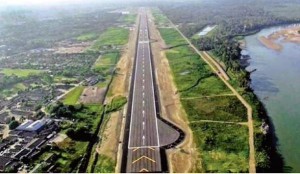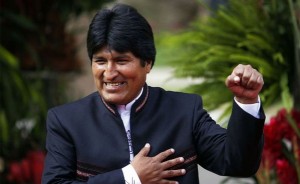EspañolThe small, central Bolivian town of Chimoré, population 21,000, is now home to a “mega airport” with the longest runway in the entire country. The 254.5 million Bol. (approximately US$36.9 million) investment in the modest community within Cochabamba state boasts a 4,000-meter runway, and is surrounded by coca plantations.
On October 17, President Evo Morales gave airport officials the green light to begin both civil and military operations through two state-run airlines, and one private.

Nevertheless, questions linger as to the curious location for such a large airport, and whether it could be used for drug-trafficking purposes.
In an interview with Spanish daily ABC, exiled Bolivian Colonel Germán Cardona reiterated allegations that high-ranking Bolivian politicians and military personnel are involved in a drug-trafficking network. He says the country is plagued with cocaine producers, with raw materials coming in through Peru and finished product exiting on its way to Russia, Iran, and Venezuela, among other countries.
Óscar Ortiz, a member of the opposition and president of the Bolivian Senate, spoke with the PanAm Post regarding possible motives for the construction of the Chimoré airport, as well as Morales’s plans to remain in office for a fourth term.
How can we explain the construction of this airport in a community of only 21,000 residents?
It’s an existing airport that the Drug Enforcement Agency (DEA) used in the past, but the government has now invested millions into expanding it.
However, even the exports from the area don’t justify this expense. For example, banana exports to Argentina travel in refrigerated trucks, not planes, since that wouldn’t be profitable. The same goes for pineapple; these are the only crops in the area other than coca.
The investment President Morales is injecting into the area is excessive, with the longest runway in the country, surpassing those in La Paz, Santa Cruz, and Cochabamaba.
What is the official explanation?

There is none. They have given speeches about how this airport is a monument to sovereignty, because the DEA previously used it to combat the Bolivian nation.
I believe this vision is purely political, without a clear indicator of its usefulness. At best, it is a white elephant, and at worst, we’ll have to see what other purposes this will be used for.
Can we assume it will be used for drug trafficking?
Well, without evidence, that’s difficult to confirm, but there has always been suspicion about planes coming in from Venezuela and questions about what it is they are transporting.
Clearly, the situation could become problematic if there is little control over which flights come in or out of this airport.
[adrotate group=”8″]
What tools does the opposition have at their disposal to prevent reelection for President Evo Morales?
As opposition congressmen, we have presented several appeals before the Constitutional Court. We don’t believe that it is constitutional for a president to be allowed to change the Constitution for his own benefit.
In the past, changes to the constitution have occurred benefiting the future of those currently in office, and we believe this posture is absolutely antidemocratic. We are aware that the Constitutional Court has been weakened, considering that most magistrates are merely sitting in for those suspended or separated from office last year.
If despite all legal action the referendum still takes place, we’ll work on a campaign to get the citizenry to vote “no.” We believe we have a good chance of achieving this, considering the Bolivian people have been very careful to keep democratic balance.

In the most recent national elections, Evo Morales’s party lost, achieving only 40 percent of the vote. Further, there was a referendum held to vote on autonomy statutes in which the public rejected most of the president’s proposals.
Therefore, we believe there is room to work with the vote on this matter.
Why doesn’t the international community regard Bolivia as an authoritarian state?
There really isn’t an international community. There are ambassadors, representatives at the United Nations, or at the Organization of American States, but at the end of the day, nobody really takes charge of overseeing that agreements created within the international community are upheld.
We may have political prisoners in Bolivia and hundreds exiled abroad. However, perhaps the figures aren’t as grave as in Venezuela, so they don’t get the same attention.
It seems that the general viewpoint in the country is that as long as there are elections, there is democracy, even though this contradicts the Inter-American Democratic Charter.
The public, however, does not demand that the government respect the Constitution and the rule of law. It’s not only a matter of voting and electing officials, but ensuring that these officials govern in a democratic way as well.
 Versión Español
Versión Español












